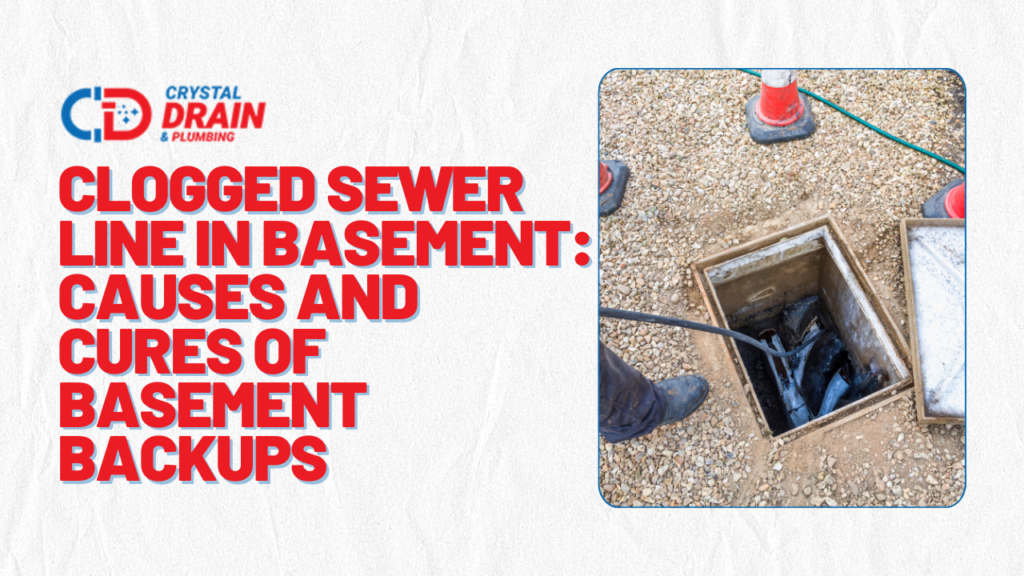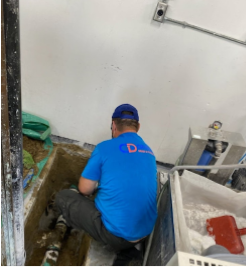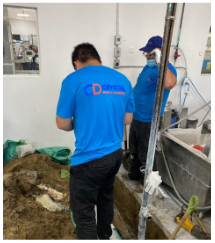Clogged Sewer Line In Basement: Causes And Cures Of Basement Backups

A clogged sewer line in the basement can cause significant inconvenience and potential property damage. At Crystal Drain & Plumbing, we understand the urgency of addressing these issues promptly and effectively. This guide will explore the common causes of basement sewer line clogs and the solutions to fix them.
Common Causes of Basement Sewer Line Clogs
1. Tree Roots

Issue:
Tree roots can infiltrate sewer lines through small cracks and joints, growing inside the pipes and causing severe blockages. As roots expand, they can obstruct the flow of wastewater, leading to backups in your basement.
Solution:
Professional sewer line inspections using camera technology can identify root infiltration. Hydro-jetting or specialized cutting tools can remove the roots. In severe cases, trenchless pipe repair or replacement may be necessary.
2. Grease Buildup
Issue:
Over time, grease and fat from kitchens can accumulate inside sewer pipes, hardening and creating a blockage. This buildup can restrict flow and cause backups.
Solution:
Regularly clean your drains and avoid pouring grease down the sink. Professional drain cleaning services, such as hydro-jetting, can effectively remove grease buildup.
3. Flushed Debris
Issue:
Items like wet wipes, sanitary products, and other non-degradable materials can create clogs when flushed down toilets. These items do not break down easily and can accumulate in sewer lines, causing backups.
Solution:
Educate household members about what can and cannot be flushed. Regular inspections and professional cleaning can prevent and address these clogs.
4. Pipe Scaling
Issue: Over time, mineral deposits can accumulate inside sewer pipes, narrowing the internal diameter and reducing flow. This scaling can lead to clogs and backups.
Solution: Professional descaling services, such as hydro-jetting, can remove mineral buildup and restore proper flow in the sewer lines.
5. Collapsed or Damaged Pipes
Issue: Aging or damaged pipes can collapse or experience structural issues, blocking the sewer line. Ground movement, heavy loads, and natural wear and tear can all contribute to this problem.
Solution: A thorough inspection with a sewer camera can identify collapsed or damaged sections of the pipe. Depending on the severity, trenchless pipe repair or replacement can address the issue without extensive excavation.
Cures for Basement Sewer Line Clogs
- Hydro-Jetting: Hydro-jetting uses high-pressure water to clean the inside of sewer lines, effectively removing blockages such as grease, debris, and mineral deposits. This method is highly effective and can restore the pipes to near-original condition.
- Snaking and Augering: Snaking and augering involve using a flexible cable with a specialized head to break up and remove clogs. This method is suitable for removing debris and minor root infiltrations.
- Trenchless Pipe Repair: For extensive damage or root infiltration, trenchless pipe repair methods like pipe bursting or pipe lining can replace or reinforce damaged sewer lines without extensive digging.

- Professional Inspections: Regular sewer line inspections using camera technology can identify potential problems early, allowing for preventative maintenance and avoiding severe blockages.
- Chemical Drain Cleaners: Chemical drain cleaners can sometimes be used for minor clogs. These chemicals dissolve organic material buildup and can be a quick fix for grease and hair clogs. However, they should be used sparingly and as a last resort, as they can damage pipes over time.
Maintenance & Preventive Measures
- Avoid Flushing Non-Flushables: Only flush toilet paper and human waste. Dispose of other items, such as wipes and sanitary products, in the trash to prevent clogs and blockages.
- Regular Maintenance: Schedule regular sewer line inspections and cleanings to catch and address issues before they become severe. This proactive approach can save you time and money in the long run.
- Tree Root Management: Be mindful of tree placement and root growth near sewer lines. Regular inspections can catch root infiltration early and prevent significant damage to your pipes.
- Install Drain Screens: Use drain screens in sinks, showers, and bathtubs to catch hair, food particles, and other debris before they enter your plumbing system. Clean these screens regularly to maintain optimal drainage.
- Monitor Water Pressure: High water pressure can stress your plumbing system and lead to leaks or damage. Use a water pressure gauge to monitor and adjust the pressure if necessary. Installing a pressure regulator can help maintain a safe and consistent level.
- Use Enzyme Cleaners: Regularly use enzyme-based drain cleaners to break down organic matter in your pipes. These cleaners are gentler on your plumbing system and can prevent buildup that leads to clogs.
- Insulate Pipes: Insulate exposed pipes in your basement to prevent freezing during cold weather. Frozen pipes can crack or burst, leading to severe damage and costly repairs.
- Install Backwater Valves: Consider installing backwater valves to prevent sewage from backing up into your basement. Regularly inspect and maintain these valves to ensure they function correctly when needed.
When to Call Crystal Drain & Plumbing
If you experience persistent clogs, frequent backups, or notice slow drainage, it’s time to call a professional. At Crystal Drain & Plumbing, we offer comprehensive sewer line services, including inspections, cleaning, and repairs. Our team is equipped with advanced tools and techniques to keep your plumbing system running smoothly.
Why Choose Crystal Drain & Plumbing?

- 24/7 Emergency Services: We are available day or night to address urgent plumbing issues.
- Advanced Techniques: We utilize modern methods like hydro-jetting and trenchless pipe repair.
- Experienced Technicians: With over 15 years of experience, our certified plumbers deliver top-quality service.
For professional assistance with your sewer line, contact Crystal Drain & Plumbing. Our team is here to help you keep your basement and home free from sewer backups and plumbing issues.
FAQs About Clogged Sewer Line In Basement
You should call a professional plumber if DIY methods like plunging and snaking don’t resolve the issue, if you notice recurring problems, if multiple drains in your home are slow, or if you suspect serious issues like tree root infiltration or pipe damage.
Signs of a clogged basement sewer line include slow drains, gurgling sounds from the pipes, foul odors, and water backups in lower-level fixtures. If you notice any of these symptoms, it’s essential to address the issue promptly to prevent further damage.
A plunger or a drain snake can help with minor clogs near the drain opening. However, for more severe blockages deeper in the sewer line, professional tools and techniques like hydro-jetting or trenchless pipe repair may be necessary. If DIY methods fail to clear the clog, it’s best to call a professional plumber.
